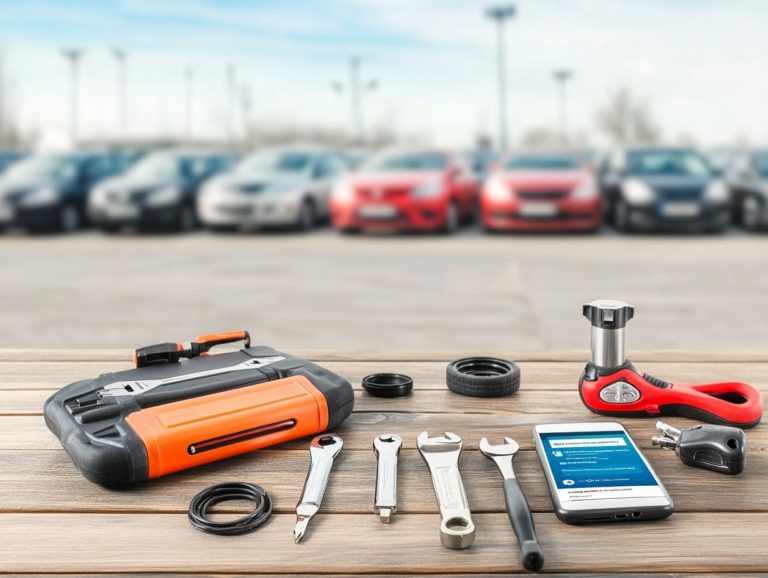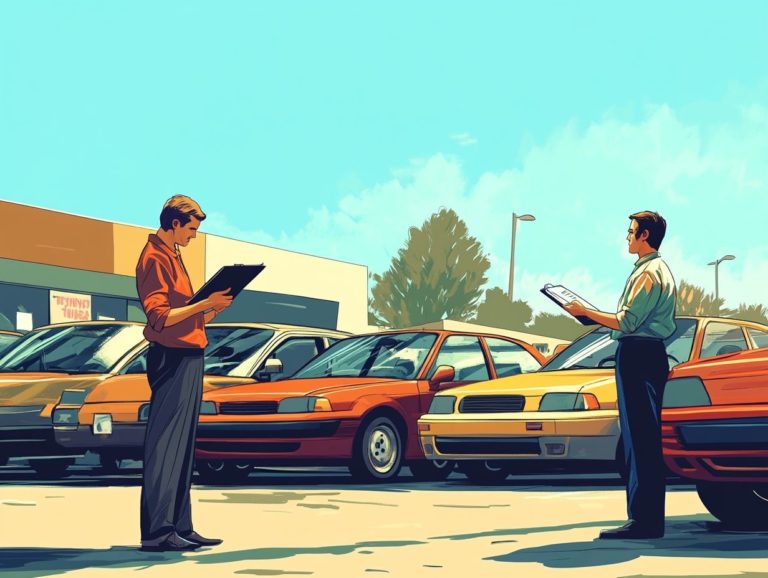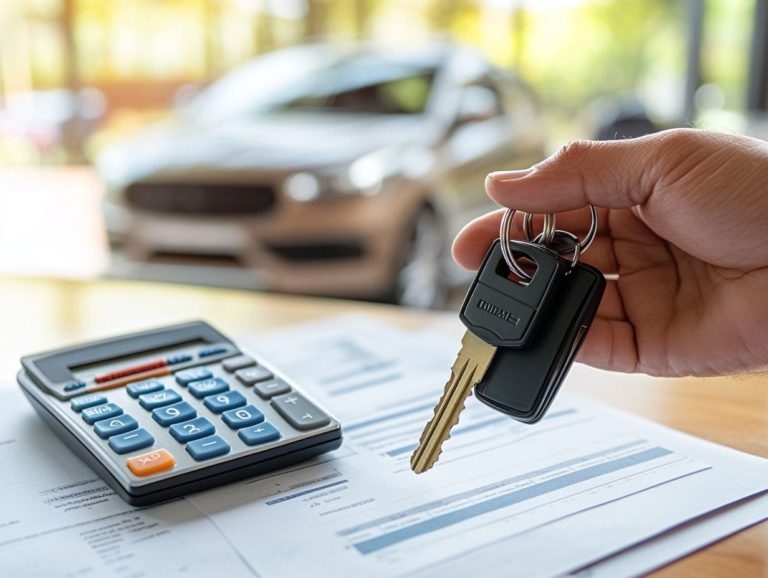Understanding Depreciation in Used Cars
When considering the purchase of a used car, grasping the concept of depreciation is crucial for your success. This article will uncover the secrets of depreciation and how it impacts your car’s value!
It will also explore various methods for calculating depreciation and provide you with valuable tips to help mitigate its impact on your vehicle s value. Whether you re a discerning buyer aiming to make a sound investment or simply curious about how depreciation functions, you ll discover insights that will inform your decisions.
Contents
- Key Takeaways:
- What is Depreciation in Used Cars?
- Factors Affecting Depreciation
- How to Calculate Depreciation
- Minimizing Depreciation
- Buying a Used Car: Understanding Depreciation’s Impact
- Frequently Asked Questions
- What is meant by depreciation in used cars?
- How does depreciation affect the value of a used car?
- What are the factors that contribute to depreciation in used cars?
- How can I estimate the depreciation value of a used car?
- Is there a way to reduce the impact of depreciation on a used car?
- How can understanding depreciation help me when buying a used car?
Key Takeaways:

Depreciation is the decrease in value of a used car over time. Age, mileage, make, model, condition, and maintenance all affect a car’s depreciation rate. To minimize depreciation, keep your car in great shape and consider buying a car with a slower depreciation rate.
What is Depreciation in Used Cars?
Depreciation in used cars means the gradual decline in a vehicle’s value over time, largely driven by factors like age, mileage, and market demand. Understanding what to know about used car depreciation plays a crucial role for both car buyers and sellers.
Understanding this concept helps you navigate the complexities of buying and selling vehicles effectively. As new cars are driven off the lot, they begin to depreciate, directly influencing resale values and the broader market landscape.
Definition and Explanation
Car depreciation refers to the decrease in a vehicle’s value over time due to various factors. This decline in worth arises from age, wear and tear, and even shifting market trends, all of which impact your vehicle’s resale value.
On average, you can expect a new car to lose about 15-20% of its value each year during those initial years. For instance, if you purchase a vehicle for $30,000, it may only be worth around $24,000 after just one year.
It’s also important to note that different types of cars depreciate at different rates; luxury vehicles tend to experience a sharper decline compared to more economical models. Understanding this concept is essential for both potential buyers and current owners.
Factors Affecting Depreciation
Several factors influence car depreciation. Understanding these factors is key to making smart decisions!
Age, mileage, make and model, the overall condition of the vehicle, and your maintenance schedules all play a vital role in shaping a car’s depreciation rate in the resale market.
Being aware of these elements can help you make informed decisions and potentially enhance the value of your investment over time.
Age and Mileage
Age and mileage are among the most critical factors that shape car depreciation. As vehicles grow older and accumulate higher mileage, they tend to experience a steeper decline in value.
Research shows that cars can lose around 15% to 20% of their value each year, with mileage playing a significant role in this downward trend. For instance, if you re averaging around 12,000 to 15,000 miles annually, exceeding this range may indicate increased wear and tear, leading to diminished resale values.
Your driving habits also come into play aggressive acceleration or taking frequent short trips can put extra strain on the engine, negatively impacting performance and longevity. Understanding how these factors interact is crucial for anyone looking to maximize their investment in a vehicle.
Make and Model

The make and model of a vehicle profoundly influence its depreciation rate. Popular models often surprise owners with how well they retain their value!
Take the Toyota Tacoma, for instance. It’s celebrated for its durability and rugged charm, making it a top choice among truck enthusiasts.
This reputation allows it to hold a strong resale value even years after purchase.
Then there’s the Jeep Wrangler. It boasts a loyal fan base thanks to its ability to drive on rough terrain. This popularity contributes to its standing as a sound investment in the automotive market.
On the compact car front, the Honda Civic shines with its efficiency and reliability. It consistently ranks as one of the best in its class, helping it maintain respectable resale prices.
In stark contrast, luxury vehicles may initially dazzle with features and prestige. However, they typically experience faster depreciation.
Their high price tags create elevated expectations that are often hard to meet as they age.
Condition and Maintenance
The overall condition of your car can significantly influence its depreciation rate. Well-maintained vehicles tend to experience a much slower value drop.
Regular maintenance boosts your vehicle s performance and plays a vital role in preserving its aesthetic appeal. By paying attention to routine services like oil changes, tire rotations, and brake inspections, you can lower long-term maintenance costs.
Keeping meticulous maintenance records is a smart move when it s time to sell or trade in your vehicle. This makes it more appealing to potential buyers.
Simple tips, such as regularly checking fluid levels, can greatly enhance your vehicle s longevity and reliability.
How to Calculate Depreciation
Calculating depreciation becomes seamless when you utilize a depreciation calculator or explore online appraisal tools. These resources consider various economic factors and your vehicle’s history.
This allows you to ascertain your car’s current value with precision and ease.
Methods and Formulas
You have various methods and formulas for calculating depreciation. The straight-line method and the declining balance method are the most common.
Each method caters to different needs, depending on how quickly the vehicle depreciates.
For instance, the straight-line method allocates the asset’s cost evenly over its useful life. Imagine you purchase a delivery van for $30,000, expecting it to last five years.
Using this method, you d end up with an annual depreciation of $6,000.
On the flip side, the declining balance method accelerates depreciation. This allows for larger expense deductions in the early years of the asset’s life.
This could especially benefit businesses that frequently refresh their fleet.
By grasping these methods, you can strategically manage your finances. This ensures that tax benefits align perfectly with how you utilize your assets.
Minimizing Depreciation
Minimizing depreciation is essential for you as a car owner. If you wish to preserve your vehicle’s value over time, adopt specific strategies for maintenance.
This can significantly lower overall depreciation costs and ensure your investment remains worthwhile.
Tips for Maintaining Value

To maintain your vehicle’s value, follow specific maintenance tips and adopt good driving habits. This can significantly enhance its condition and slow down depreciation.
Regular servicing is essential; it ensures that all components operate smoothly and efficiently. Simple actions, such as checking tire pressure and keeping the car clean, can lead to noticeable differences over time.
Your driving habits also play a crucial role in your vehicle’s longevity. Gentle acceleration and braking reduce wear and tear, resulting in fewer repairs.
Avoiding harsh driving conditions whenever possible can protect the engine and overall performance, ultimately preserving both value and reliability.
Start implementing these tips today to protect your investment!
Buying a Used Car: Understanding Depreciation’s Impact
When you re in the market for a used car, understanding how depreciation works is crucial. It plays a significant role in determining resale value and can profoundly influence your overall purchasing decision, especially in the context of ever-changing market trends.
How Depreciation Affects Pricing
Depreciation significantly lowers the resale value of vehicles. It’s essential to grasp market demand as you consider your pricing strategy.
As vehicles age and accumulate mileage, their worth inevitably declines. This depreciation is notably influenced by how interested buyers are at any given moment. When demand is high, you can often command a better price that reflects your strategic pricing approach.
Conversely, during periods of low demand, even a meticulously maintained vehicle may struggle to fetch an acceptable resale value. Evaluate how changing consumer preferences shape pricing.
A thorough understanding of both depreciation trends and market demand will empower you to craft an effective pricing strategy that maximizes profits and minimizes losses.
Considerations for Buyers
When navigating the resale market, several critical considerations come into play for potential buyers, including market conditions and the significance of the vehicle identification number (VIN). Understanding these elements is crucial for making informed decisions.
Begin by thoroughly researching vehicle history reports, which can unveil vital information regarding past accidents, service records, and any title issues that might impact the vehicle’s value.
Staying attuned to current market trends will ensure you’re aware of seasonal fluctuations and pricing strategies. The VIN is essential in this process, enabling you to track specific details about the car’s manufacturing, recall notices, and depreciation over time.
These factors collectively help you determine whether a vehicle is a sound investment.
Frequently Asked Questions
What is meant by depreciation in used cars?

Depreciation in used cars refers to the decrease in value of a vehicle over time due to factors such as age, wear and tear, market demand, and mileage. To better understand this process, it’s helpful to consider what to know about car depreciation, as it is a natural and inevitable process that affects all cars.
How does depreciation affect the value of a used car?
Depreciation plays a significant role in determining the resale value of a used car. As a car ages, its value decreases, affecting the amount a seller can expect to receive when selling the vehicle. The rate of depreciation varies depending on the make, model, and condition of the car.
What are the factors that contribute to depreciation in used cars?
- Model and brand of the vehicle
- Demand for that specific car in the market
- Condition and mileage of the car
- Technological changes or features that make the car outdated
How can I estimate the depreciation value of a used car?
You can estimate the depreciation value of a used car by using tools such as the Kelley Blue Book or the National Automobile Dealers Association (NADA) Guide. These resources take into account factors such as the make, model, mileage, and condition of the car to provide an estimate of its current value.
Is there a way to reduce the impact of depreciation on a used car?
While depreciation cannot be completely avoided, there are steps you can take to reduce its impact on a used car. These include maintaining the car in good condition, keeping mileage low, and opting for popular and in-demand car models that have a slower rate of depreciation.
How can understanding depreciation help me when buying a used car?
Understanding depreciation can help you make an informed decision when buying a used car. By knowing how much a car is expected to depreciate, you can negotiate a fair price and avoid overpaying for the vehicle. It can also help you plan for future costs, such as potential repairs and resale value.
Ready to find the best used car deals? Start your search today!






